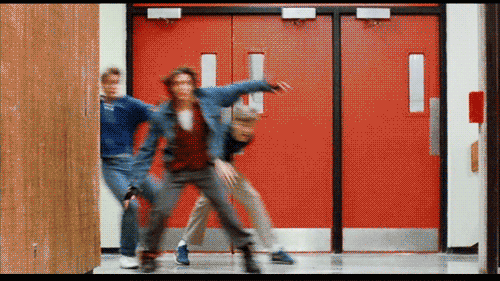The other day I biked to work. It was a grueling seven mile ride made even more difficult because all I have is a mountain bike and the surrounding area wouldn't be what you'd call cyclist-friendly.
On my way home I came to a mental crossroads. I was berated by the voice of some lazy, tired part of me to stop. "Enough with the biking already. These hills are killing me!"
At that point I was about four miles away from my house--less than half of the trek completed. What were my choices? Was stopping and looking like a schlub on the side of the road an option? Would I walk my bike the rest of the way and have the little free-time I get wasted because I decided to go for a slower option?
No. What I did was ignore that stupid voice and pressed on.
I knew that it would be difficult, yes, but the reward at the end was greater than the temporary relief of stopping. I knew that if I kept going, my muscles would be made stronger. My next trip would be easier because my anatomy and my spirit would have been primed for it. I knew the only way to get better was to keep going.
Now, let's talk writing.
Every author whose books fill bookstore shelves has faced, received, and been pummeled by rejection. Rejection is one of those things that is talked about in the writing community as a necessary evil and a "thems the breaks, kid" brushing off of the shoulder.
But that doesn't mean it doesn't sting. It doesn't mean that it's easy to take.
But if this gig was easy, everyone would be doing it.
Some authors are more vocal about their early struggles than others and I'm sure it's easy to forget the battle of first starting out, or we might not fully realize or appreciate that all these big wig writers have been said no to.
I can't speak for self-publishing, but let's look at the traditional route.
Some people may say, "Huzzah! I've got an agent. Life has now been made easy."
Oh, boy.
Well, congrats on getting representation, but don't forget that now that agent has to submit to editors and rejection is still a very real possibility. If this was a video game: You've finally found someone who has agreed to let you into the dungeon, but you've got a long road until the boss battle. And then you have to win.
So, you've gotten an editor who loves your manuscript. Again, hooray for you! But that editor, more than likely, has to take it to a meeting of people who make the decision of what their publishing house will be printing that year. Your work now has to impress at least a majority of those at this gathering.
You're going to be published!. Hip hop hooray. Now, I'm sure this is a wonderful feeling that no one can take away from you. But, again, rejection is a very real thing. If your book doesn't sell well enough in the eyes of the publisher, they might not take another chance on you. And then you basically have to go back to Level 1. I know that no one plans on this happening and, if you and the agent and the editor have busted tail to make the book the best it can be, it's out of your hands.
But rejection is still real.
Your book and your writing career are in the readers' hands. This is a fact that applies to both traditional and self-published endeavors.
So, Sean, what's the point? I mean, with all this rejection why should I even try?
I remember when I told a family member I wanted to become a fireman. They said pretty much the same thing. "A lot of people go out for that job. It's hard to get in."
Two months ago marked four years of me being a professional firefighter.
Just because something is hard, does it mean it's not worth the pursuit?
I believe it makes it that much more cherished and wonderful when you finally do succeed.
Rejection gives you tough skin, a badge of honor in your attempt. It weeds out those who didn't want it bad enough. It strengthens those that press on. Being told no should build up the appreciation of the inevitable yes.
And it is inevitable.
I firmly believe that those who never give up learn a vast amount more than those who never start. With that hard-earned knowledge, you become better. You find new ways of telling stories and try things that no one else can.
You become a professional.
I am not here to tell you that rejection becomes easier. It absolutely doesn't go away. What I'm saying is that, like burs on a cotton plant, like a hangover from too much fun, it goes with the territory. And those that want to live on these crazy, hard-toil plains have to learn to accept it.
- Sean
P.S.
Sean's Hydra Querying Technique
Remember the tale of Hercules and the Hydra and how every time he whacked off one head, two would grow in its place? Here's a trick that can help you during the rough days logged in the query trenches.
1. Query an initial set of agents. Most people say 10.
2. If you get a rejection, query two more agents in place of that one who passed.
This promotes momentum and helps you cast a big net. Please, still do your research and make sure the intended agents rep your kind of manuscript.






















